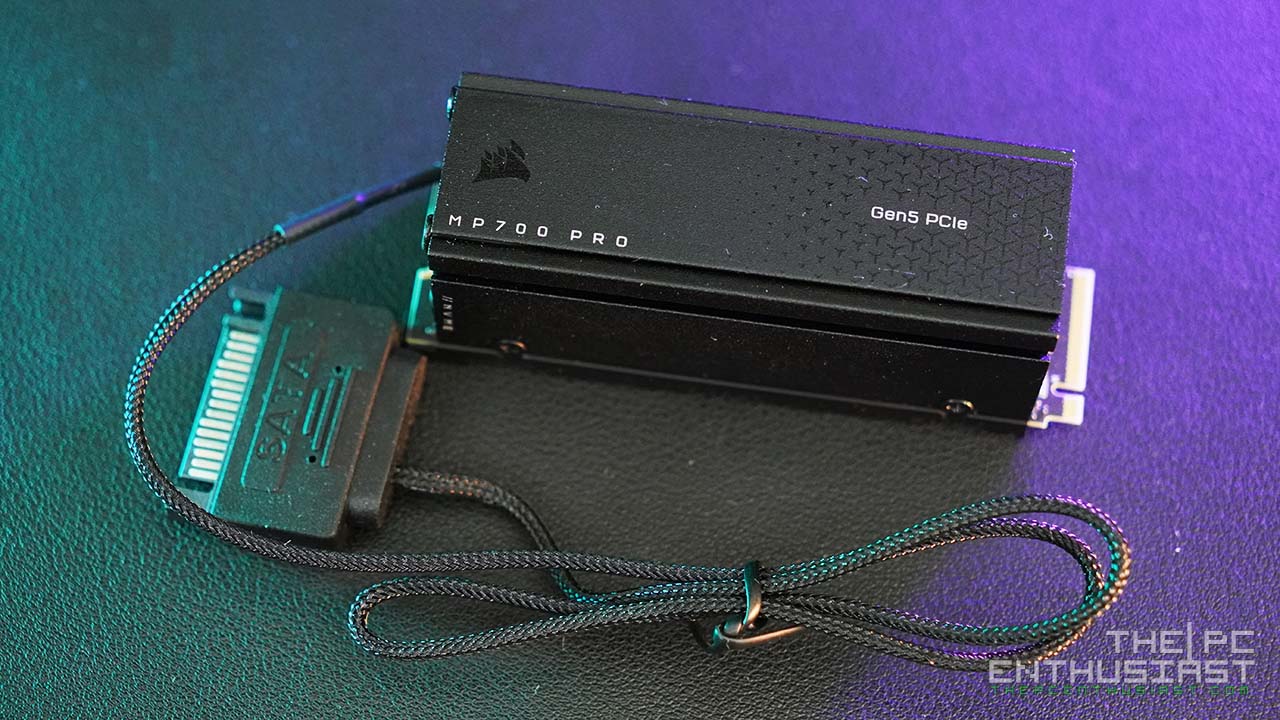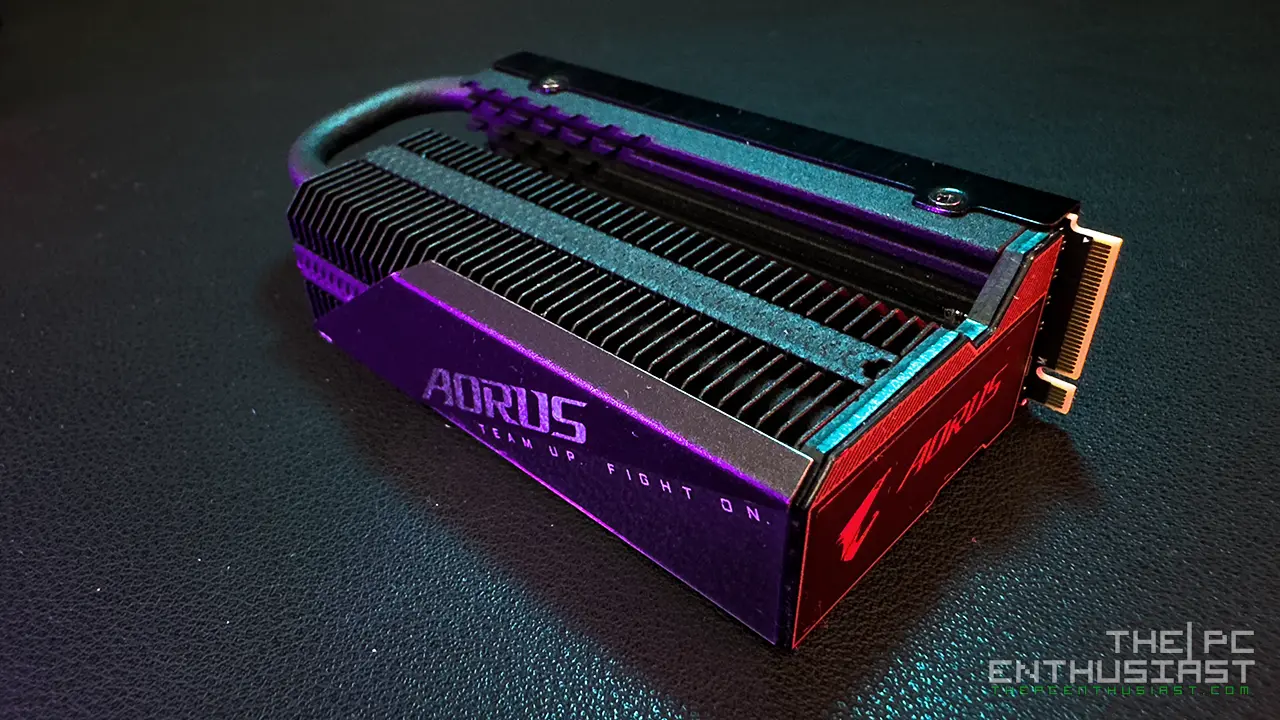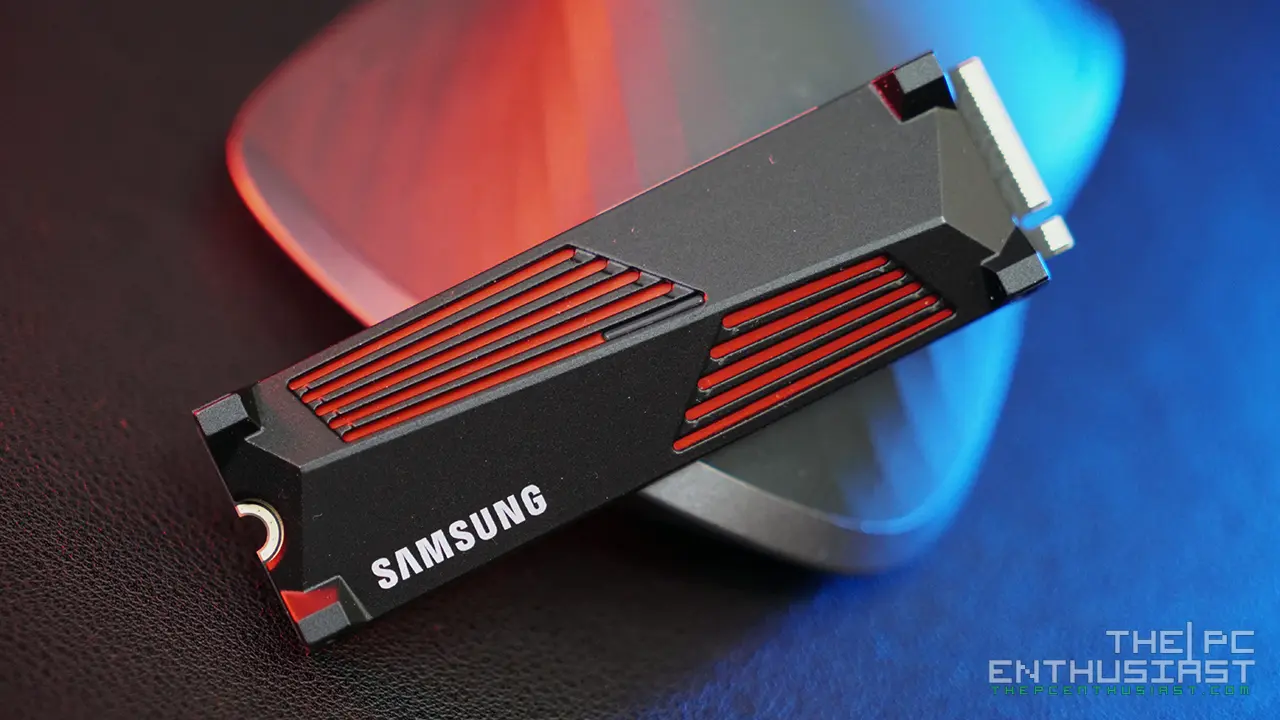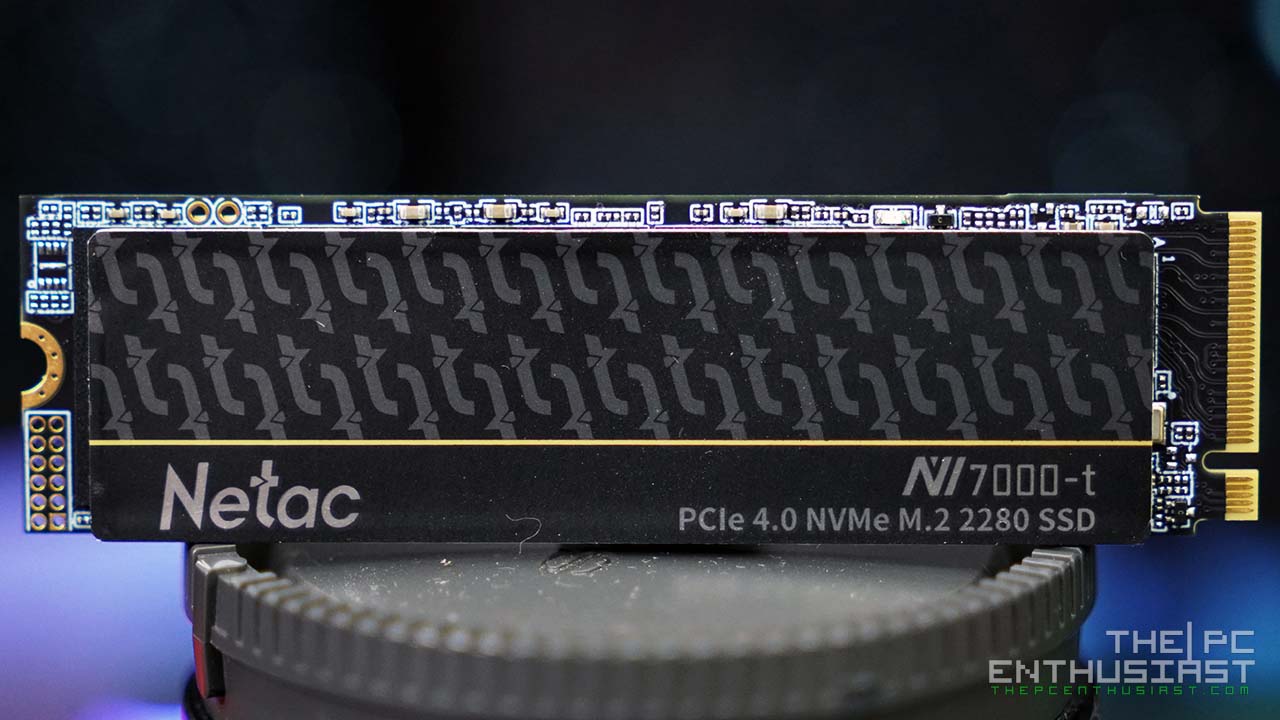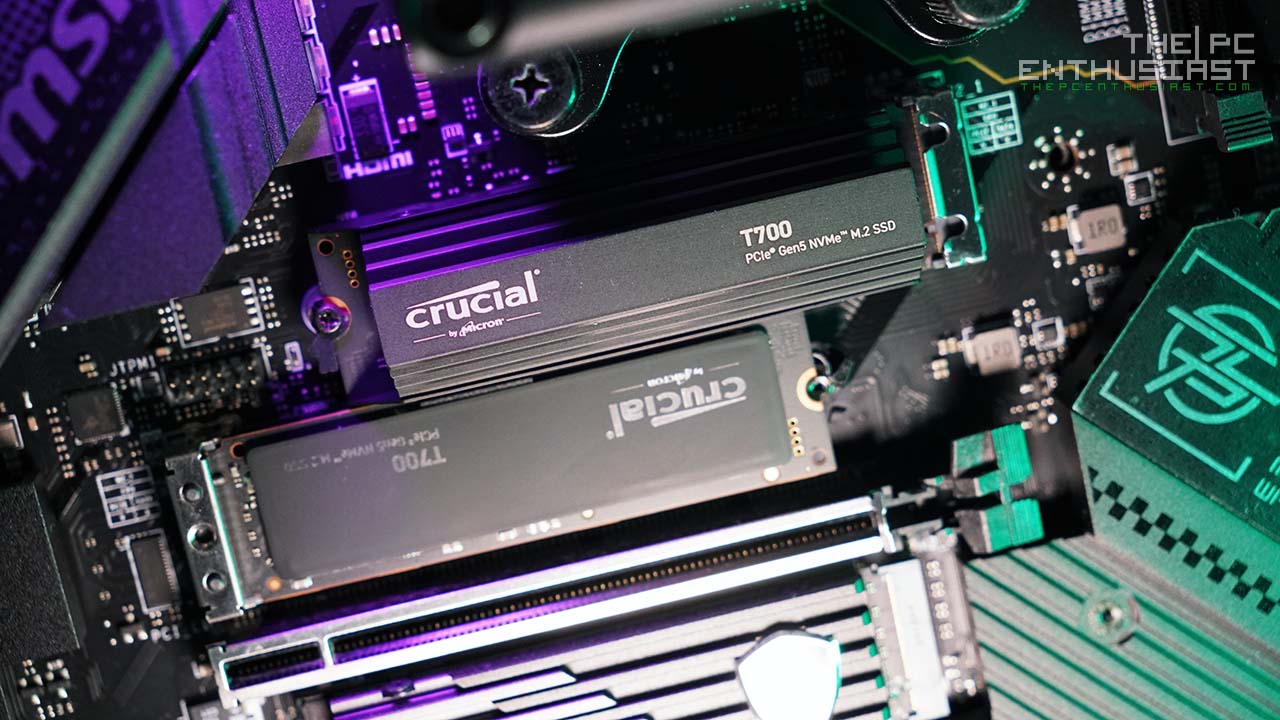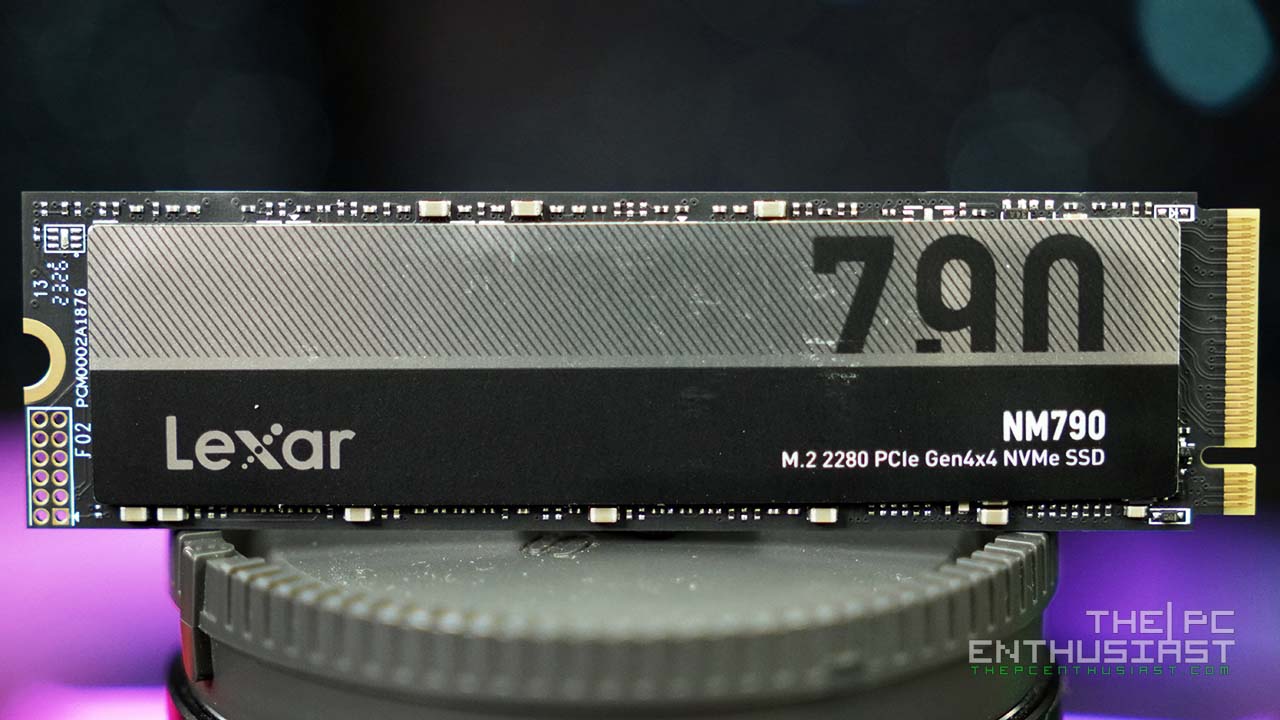Since Phison‘s release of its new E26 controller, more and more Gen5 SSDs are entering the market. A couple of months ago, MSI released its Spatium M570 PRO FROZR, a PCIe 5.0 NVMe M.2 SSD featuring Phison’s E26 controller paired with 3D TLC NAND flash chips. MSI has been teasing its Gen5 SSDs for many months, and they even showcased them at CES 2024 last month. Today, we are checking out the Spatium M570 Pro Frozr Gen5 SSD with 2TB capacity. Let’s find out how MSI’s Spatium M570 Pro performs and how it stacks up against the competition.
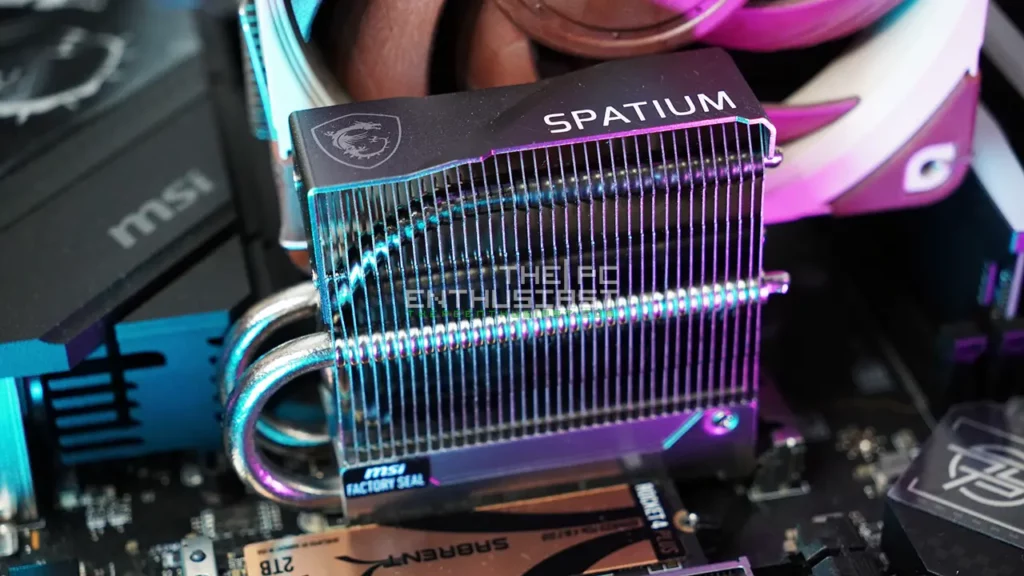
MSI Spatium M570 Pro Frozr PCIe 5.0 NVMe M.2 2TB SSD Review
MSI has upgraded its SSD lineup with the Spatium M570 Pro, a second-generation PCIe 5.0 NVMe SSD that follows the initial Spatium M570 series, known for its distinctive golden heatsink. The Spatium M570 offered sequential read and write speeds of up to 10,000MB/s.
The latest M570 Pro, however, pushes the speed further, reaching up to 12,400MB/s and 11,800MB/s in sequential read and write, respectively. It offers a notable improvement over the first generation of Gen5 SSDs and enhances overall performance for users seeking faster data access and transfer rates.
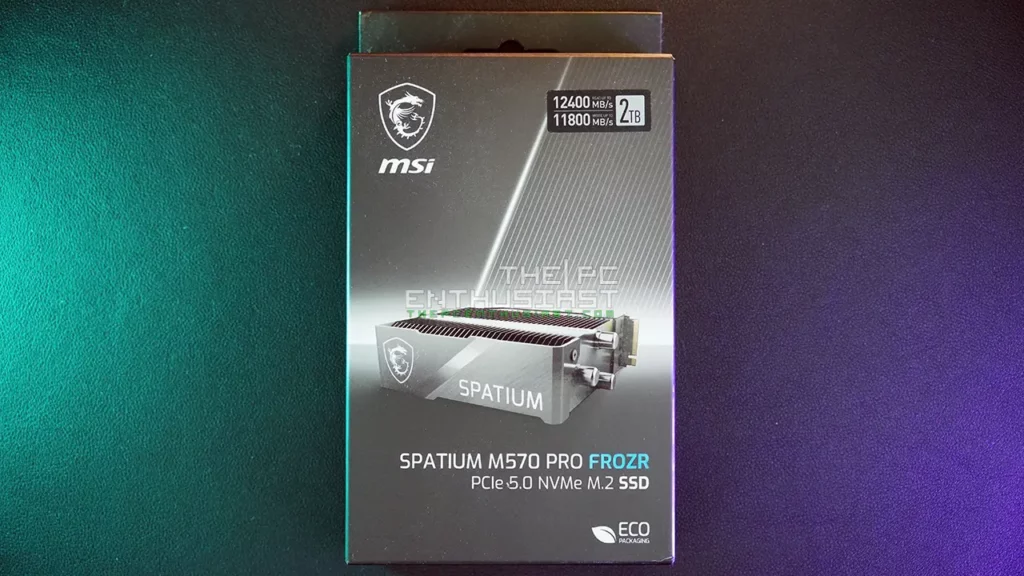
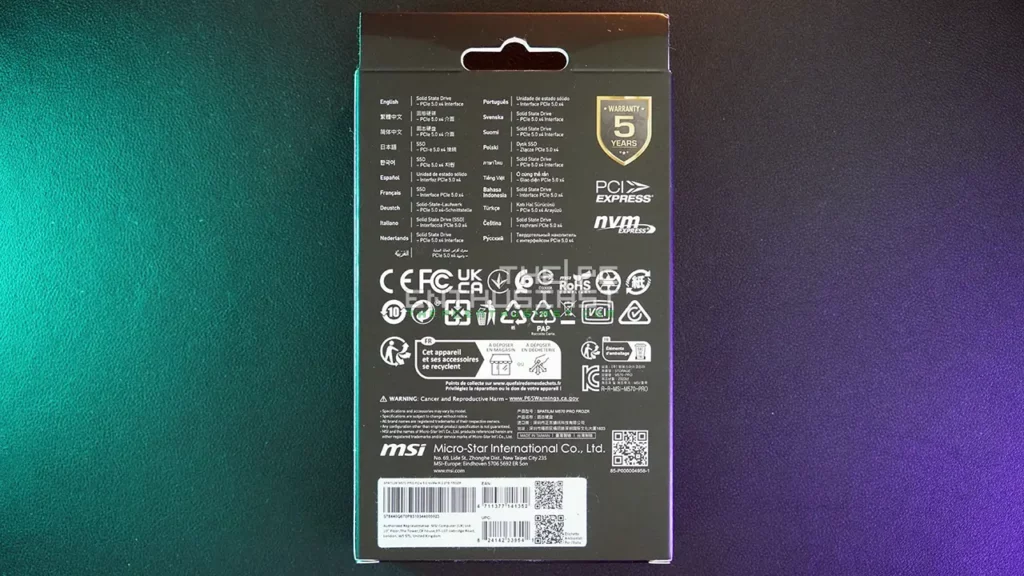
The Spatium M570 Pro Frozr came with a small compact box. You can see a photo of the SSD at the front, including the capacity and speed, and some additional information is printed on the back of the box. Nothing is fancy about it, but the SSD is cradled securely inside the box.
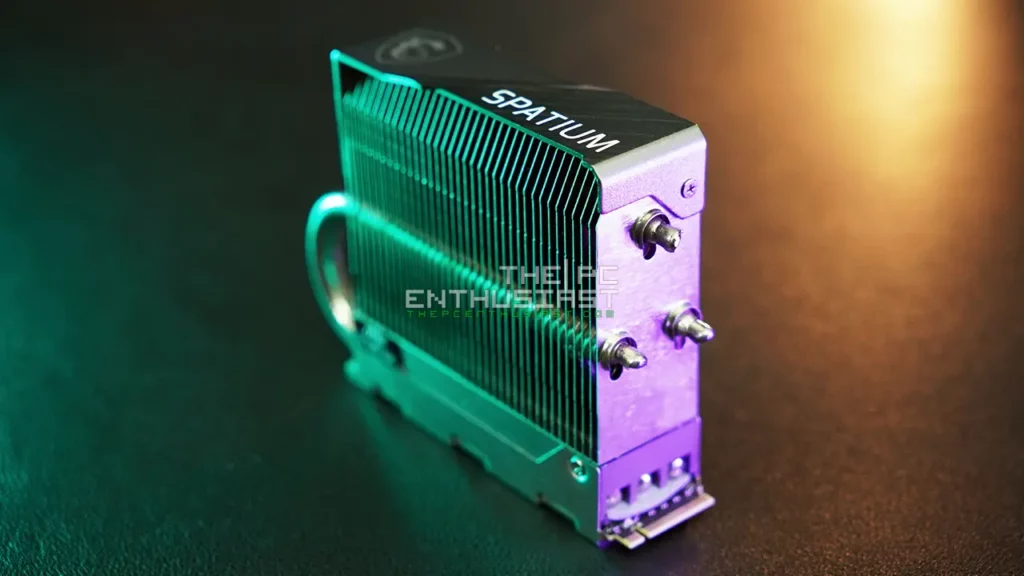
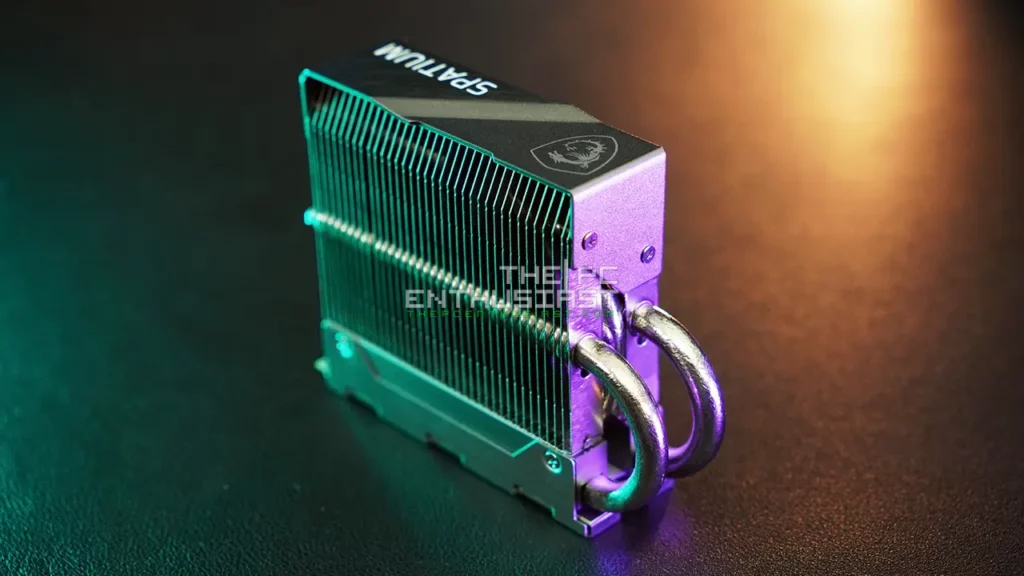
Out of the box, the Spatium M570 Pro is pre-assembled, meaning the SSD is already attached to the heatsink. I think MSI discourages users from disassembling or removing the heatsink from the SSD. There’s a chance that users may damage the SSD itself. That’s also the reason why I didn’t disassemble my M570 Pro.
The heatsink of the SSD is quite tall, but it doesn’t have an active fan, unlike what MSI teased to us sometime mid-last year. The one with an active cooling fan is the M570 Pro Frozr+, which can reach up to 14,000MB/s and 12,000MB/s in sequential read and write speed, respectively. Unfortunately, that model isn’t out yet.
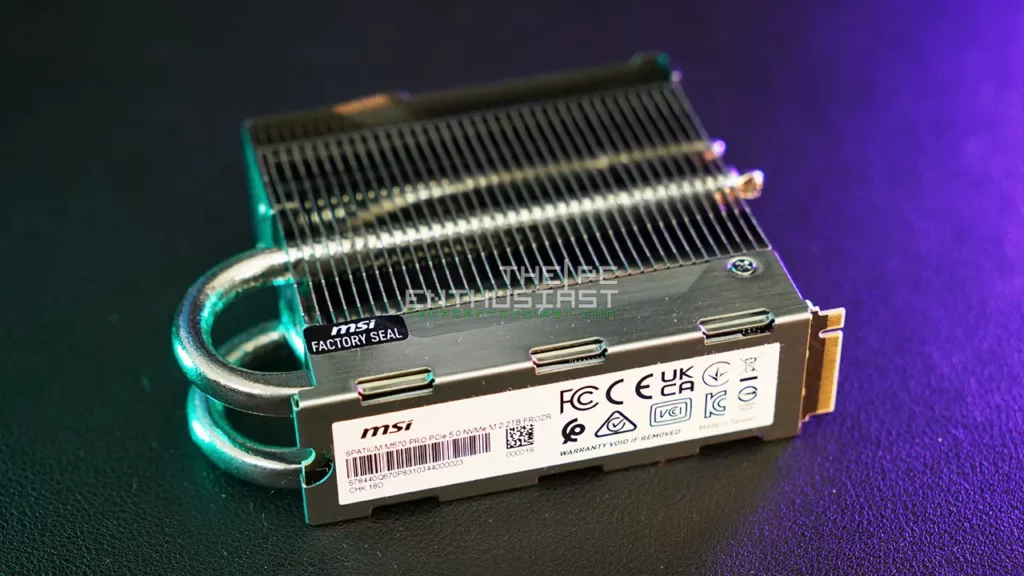
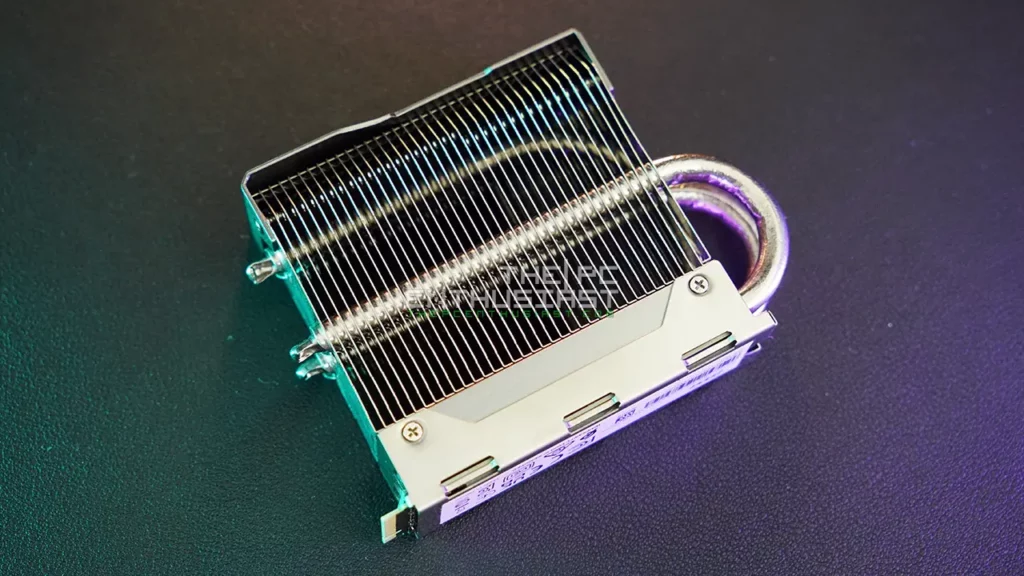
Size-wise, the Spatium M570 Pro Frozr’s heatsink is quite tall. It measures 94.80mm in length, 71.65mm in height, and 24.00mm in width. Although the heatsink is not that thick, unfortunately, MSI didn’t tilt or make an offset on the heatsink, unlike Gigabyte’s Aorus 12000 Gen5 SSD. As a result, if you have a large tower cooler, like Noctua NH-U12A, there’s not enough room or clearance, and the Spatium M570 Pro’s heatsink will hit the CPU cooler. It would be best to use an AIO liquid cooler; otherwise, you may encounter some clearance issues.
I didn’t dismantle my M570 Pro, but under the hood are the Phison PS5026-E26 controller, four Micron 232L 3D TLC NAND flash chips (two on each side of the PCB), and a 4GB SKhynix LPDDR4 DRAM for the 2TB capacity.
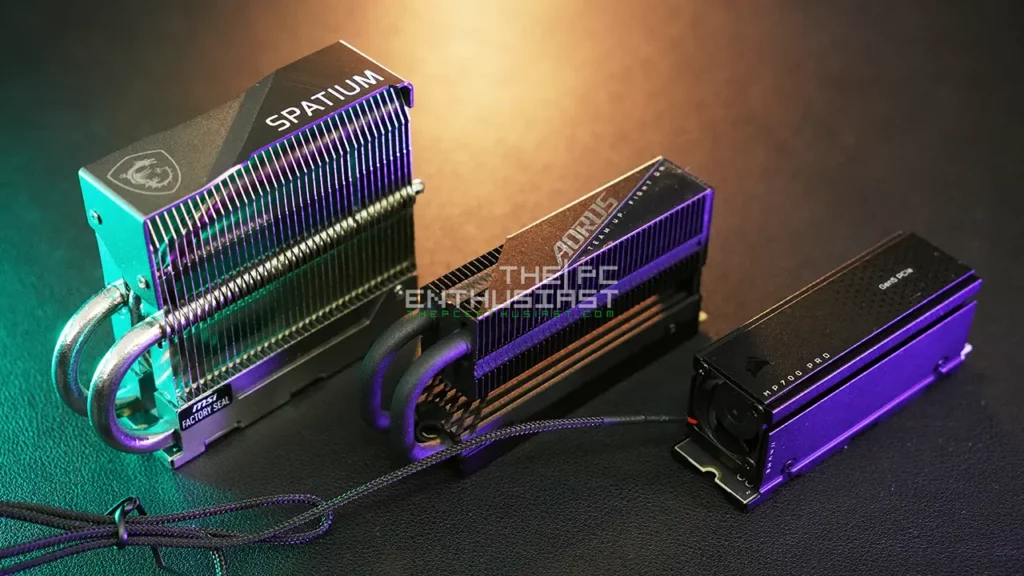
As you can see from the photo above, MSI’s Spatium M570 Pro Frozr is the tallest. Gigabyte’s Aorus Gen5 12000 SSD is in between, followed by Corsair’s MP700 Pro Gen5 SSD. The Corsair MP700 Pro is the smallest or more compact Gen5 SSD among the three. But it has an active cooling fan, and you must connect it to a SATA power.
Let’s see how these Gen5 SSDs stack up against each other and some of the fastest Gen4 SSDs.
MSI Spatium M570 Pro Frozr Specifications
| Model Name | SPATIUM M570 PRO PCIe 5.0 NVMe M.2 FROZR | ||
|---|---|---|---|
| Capacity | 1TB | 2TB | 4TB |
| Controller | PHISON E26 | ||
| Flash Memory | 3D NAND | ||
| Dram Cache | 2GB LPDDR4 | 4GB LPDDR4 | 8GB LPDDR4 |
| Form Factor | M.2 2280 | ||
| Interface | PCIe Gen5x4, NVMe 2.0 | ||
| Compatibility | PCIe Gen5 / Gen4 / Gen3 / Gen2 / Gen1 | ||
| Dimensions | 94.80mm (L) x 24.00mm (W) x 71.65mm (H) Recommended installation space: up to 22 x 110 mm available |
||
| Sequential Read Up To (MB/s) | 11700 | 12400 | 12400 |
| Sequential Write Up To (MB/s) | 9500 | 11800 | 11800 |
| Maximum Operating Power (W) | 11 | 11.5 | 11.5 |
| Idle Power Ps3 (MW) | 144 | ||
| Low Power L1.2 (MW) | 85 | ||
| Operating Temperatures | 0°C – 70°C | ||
| Storage Temperatures | -40°C – 85°C | ||
| Terabytes Written (TBW) | 700 | 1400 | 3000 |
| Mean Time Between Failure (MTBF) | Up to 1,600,000 Hours | ||
| Limited Warranty | 5 Years, or the coverage for the maximum TBW as stated, whichever comes first. | ||
| Advanced Features | TRIM (Performance Optimization, OS Support required) SMART (Self-Monitoring, Analysis and Reporting Technology) LDPC (Low Density Parity Check) ECC Algorithm End to End Data Path Protection APST (Autonomous Power State Transition) AES256/OPAL 2.0 (Encryption, Data Security) |
||
Check the latest pricing and availability: (#ad)
MSI Spatium M570 Pro Frozr Gen5 SSD is now available on Amazon here.
Test Setup
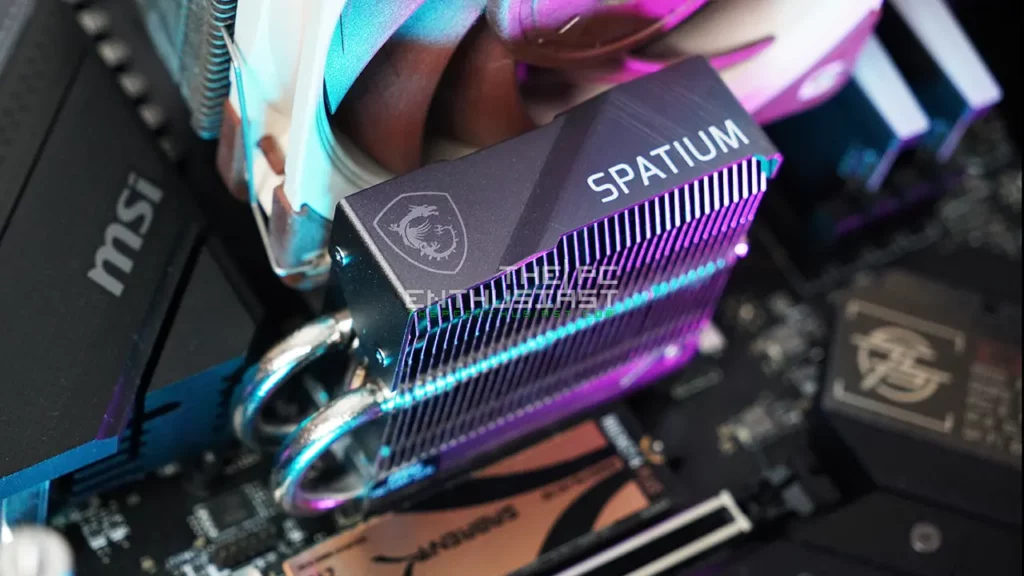
I tested the Spatium M570 Pro Frozr 2TB capacity on an X670E motherboard with an AMD Ryzen 7 7700X. I installed the drive on the first M.2 slot. The CPU connects to the first M.2 slot, just below the CPU socket. Below are the rest of the system’s specifications:
| Operating System | Windows 11 Pro |
| Processor | AMD Ryzen 7 7700X |
| Motherboard | MSI MPG X670E Carbon WiFi |
| Memory | Corsair Vengeance RGB DDR5-6000MHz CL30 AMD EXPO |
| Graphics Card | MSI GeForce RTX 4060 Ti Gaming X Trio |
| OS Drive | MSI Spatium M480 Play |
| Game Drive | SanDisk Extreme PRO Portable SSD V2 and Extreme Portable SSD V2 |
| Power Supply | MSI MPG A1000G PCIE5 |
| Chassis | Open Benchtable BC-1 V2 |
| Monitor | MSI Optix MPG321UR-QD 4K 144Hz |
MSI Spatium M570 Pro Frozr 2TB SSD Benchmark Results
In this review, I have included five other Gen5 SSDs for comparison, aside from the MSI Spatium M570 Pro Frozr. These Gen5 SSDs are the Crucial T700, Seagate FireCuda 540, and ADATA Legend 970. These three are “first generation” Gen5 SSDs, meaning their advertised speeds are only up to 10,000MB/s. Meanwhile, the MSI Spatium M570 Pro Frozr, Gigabyte Aorus Gen5 12000, and Corsair MP700 Pro are “second generation” PCIe 5.0 SSDs offering speeds of up to 12,000MB/s.
Note that the 1TB capacity of the Aorus Gen5 12000 SSD is slightly slower than the 2TB capacity. Its advertised sequential speeds are only up to 11,700 MB/s read and up to 9,500MB/s write. So, it’s slightly slower compared to the 2TB capacity Gen5 SSDs.
AJA Benchmark Results

The AJA System test does a quick/burst read and write on the drive, making it purely a sequential test. In this test, the Spatium M570 Pro Frozr didn’t end up at the top of the chart. Instead, it fell slightly behind the Crucial T700 and Corsair MP700 Pro when it comes to write speed. However, the difference is so small that it’s negligible.
Since the charts are sorted according to write speed, it landed on the third spot but with a tiny difference. However, the Spatium M570 Pro Frozr has the fastest read speed, nearly reaching 8,200MB/s in this test.
AS SSD Benchmark Results
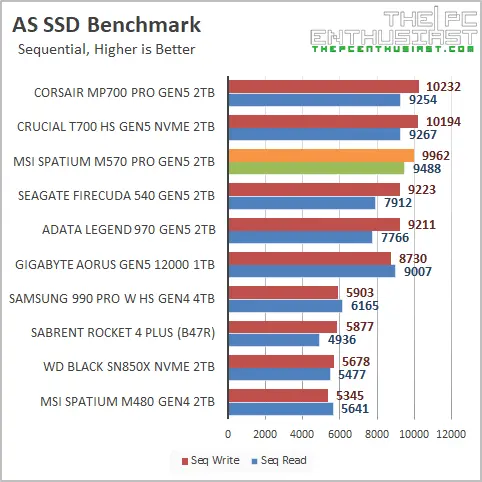
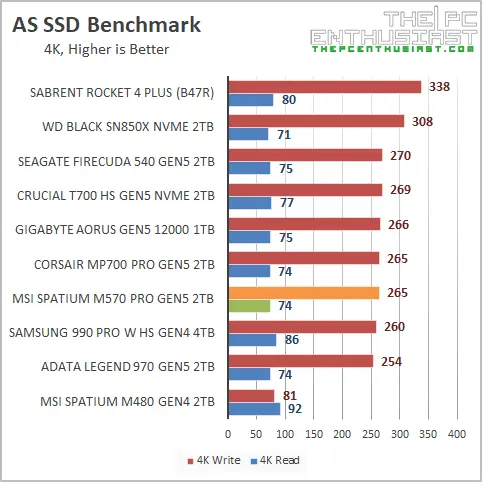
The AS SSD benchmark’s sequential test shows a similar pattern where the Spatium M570 Pro landed in 3rd place. Again, the difference between MSI, Crucial, and Corsair’s Gen5 SSD is just a hairline.
However, when it comes to 4K random tests, these Gen5 SSDS are no faster than a Gen4 SSD. As you can see from the chart above, the Gen5 SSDs were outperformed by Sabrent’s Rocket 4 Plus and WD Black SN850X; both are Gen4 SSDs.
ATTO Disk Benchmark Results
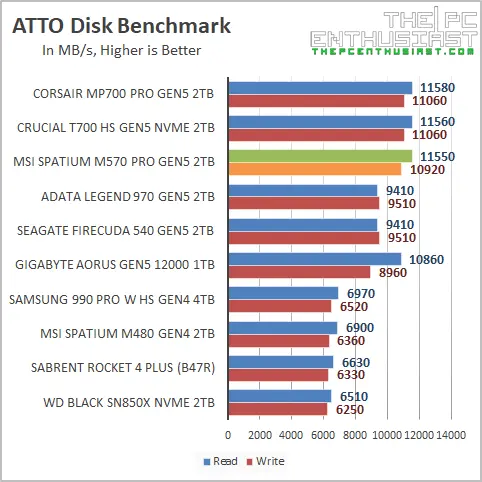
Like the AJA System test, the ATTO Disk benchmark is purely a sequential test. However, this test takes much longer than the AJA system. Again, we can see a similar pattern or behavior where the Spatium M570 Pro Frozr landed in the third spot. However, the difference is so tiny that these three Gen5 SSDs are basically the same overall.
CrystalDiskmark Benchmark Results
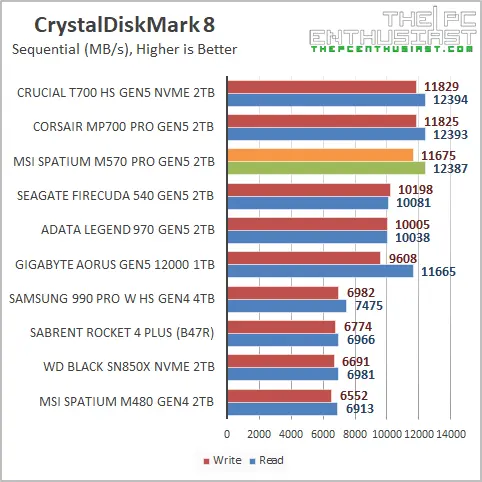
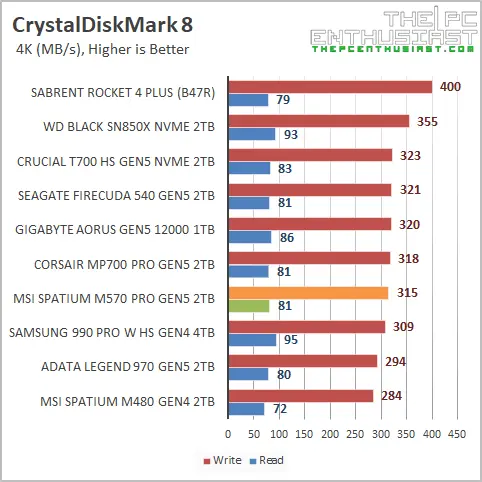
Like in the AS SSD benchmark, we got similar results when testing these Gen5 SSDs in CrystalDiskMark 8. The Spatium M570 Pro Frozr, Corsair MP700 Pro, and Crucial T700 all performed similarly, and the speeds of these SSDs are virtually indistinguishable. Again, the 4K random performance of these SSDs is not that impressive, and a Gen4 SSD can outperform them.
Why is 4K Random Workload Important?
4K random performance is important in SSDs because it shows how well the drive can handle many small, scattered tasks like opening apps or files and doing several things simultaneously. A good score here means the SSD can handle these tasks quickly, making your computer faster and more responsive overall.
In tasks like gaming, loading applications, or booting up the operating system, the computer needs to access many small files scattered across the storage drive. A high 4K random performance ensures that the SSD can quickly locate and retrieve these files, resulting in faster load times and smoother operation.
I hope we will see SSDs improve not only the sequential speeds but also the random read and write speeds.
PCMark 10 Full System Drive Benchmark Results
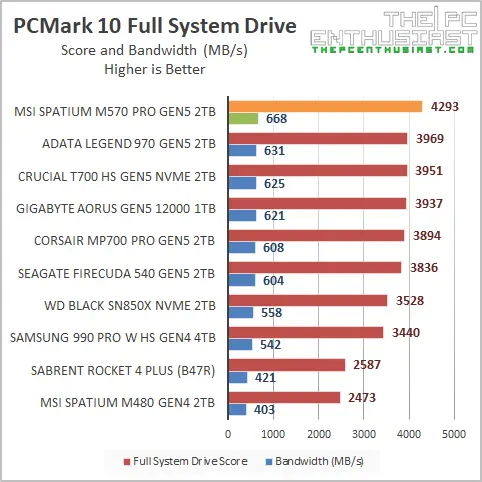
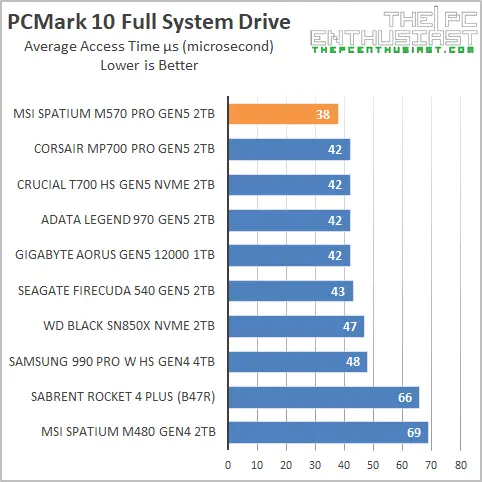
Lastly, I put the MSI Spatium M570 Pro Frozr to the test using the PCMark 10 Full System Drive Benchmark suite, a rigorous evaluation that can take over an hour to complete. This benchmark uses a diverse range of real-world scenarios from widely-used applications like Adobe Creative Suite and Microsoft Office, along with common daily computing tasks, providing a thorough performance assessment of contemporary storage solutions.
Despite not ending at the top of the charts on the previous (short) tests, MSI’s Spatium M570 Pro Frozr is the fastest during the PCMark 10 Full System Drive benchmark. Not only did it get the highest score and fastest bandwidth, but it also had the lowest average access time.
By the way, regarding the drive’s temperature. During my testing, the Spatium M570 Pro Frozr with 2TB capacity reached a peak temperature of 41°C and maintained an average of 37°C. Despite lacking an active cooling fan, the SSD remained relatively cool, likely benefiting from the proximity to a large 120mm CPU fan, which possibly facilitated airflow through its heatsink, aiding in its cooling.
MSI Spatium M570 Pro Frozr Gen5 SSD Review Conclusion
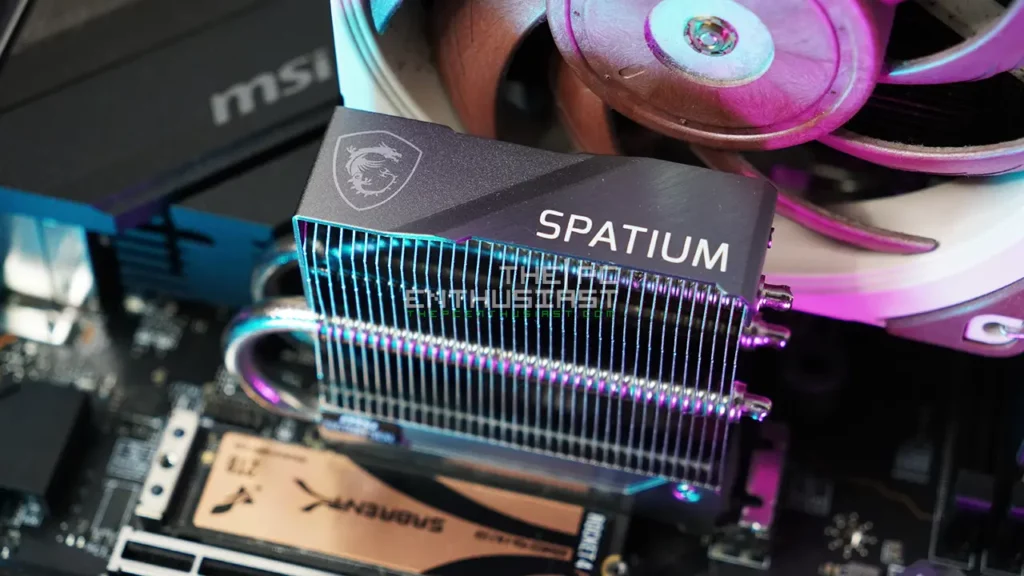
The MSI Spatium M570 Pro Frozr Gen5 SSD’s sequential speeds are impressive and fast. The heatsink, albeit tall, works well. Keep in mind that if you are using a large CPU air cooler, it will hit the Spatium M570 Pro’s heatsink.
Also, while it did not end up at the top of the charts in every test, it ended up at the top during the most demanding and intensive benchmark test. However, there are a few things you need to consider before jumping on the Gen5 SSD bandwagon.
As I have mentioned above regarding the importance of 4K random workloads, these Gen5 SSDs do not really feel faster in day-to-day typical tasks, even in gaming. Perhaps you may see a noticeable improvement or smoothness if your workload involves primarily sequential workloads, like large file videos and photos.
Another thing to consider is you need a compatible motherboard to take advantage of these Gen5 SSDs. Most motherboards and even laptops these days only have Gen4 M.2 slots. Only the latest platforms support Gen5 SSDs. While these Gen5 SSDs will work even if you install them on a Gen4 slot, I would not recommend it as it would defeat the purpose of getting a Gen5 SSD. If that’s the case, buy a Gen4 SSD instead, which is cheaper than a Gen5 SSD.
Speaking of the price, Gen5 SSDs are more expensive than Gen4 SSDs. I don’t yet have pricing and availability details for the Spatium M570 Pro Frozr for North America. But based on the current retail price of the M570 (non-Pro), I’m guessing that the Pro version will be more expensive. Hopefully not, because it won’t be able to compete against other Gen5 SSDs when it comes to pricing. Also, waiting for the prices to come down first is always a good idea.
SSD pricing can be volatile, and we often see them discounted during the sale season. Sometimes, Amazon discounts these SSDs randomly. But at the time of writing this review, it looks like Gen5 SSD prices are on the high side.
At the end of the day, we can’t deny how fast MSI’s Spatium M570 Pro Frozr is. And if you want one, unfortunately, you’ll have to wait since it’s yet to be available in North America at the time of writing.
Check the latest pricing and availability: (#ad)
MSI Spatium M570 Pro Frozr Gen5 SSD is now available on Amazon here.


